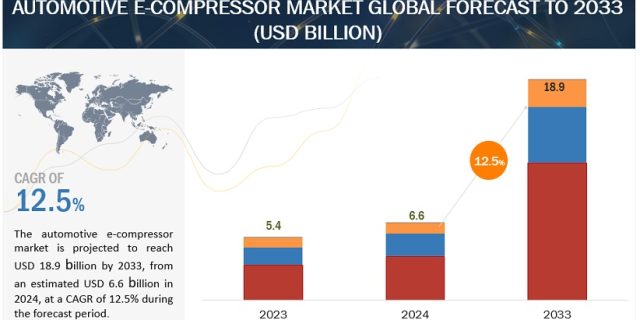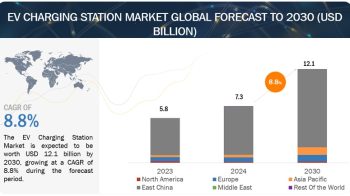
The automotive e-compressor market is projected to reach USD 18.9 billion by 2033, from an estimated USD 6.6 billion in 2024, at a CAGR of 12.5% during the forecast period. The key factors driving the market are the growing demand for electric cars, stringent emission regulation & heightened environmental concerns, along with the increased awareness about climate control & comfort features.
Market Dynamics
DRIVER: Rising global demand for electric vehicle.
With the growing popularity of electric vehicles, automotive manufacturers are scaling up their production of electric models, leading to an increased demand for e-compressors. These components are critical to the efficient operation of the climate control systems found in electric vehicles. Contrary to traditional ICE vehicles, electric vehicles rely on e-compressors to manage air conditioning and heating functions. As the global automotive industry continues to shift toward electrification, with more automakers investing in EV technology and expanding their product lines, the demand for e-compressors is expected to surge.
Download PDF Brochure @ https://www.marketsandmarkets.com/pdfdownloadNew.asp?id=163389897
OPPORTUNITY:Advancement in e-compressor technology
Advancements in e-compressor technology present significant opportunities for the automotive industry. Improved e-compressor efficiency and faster charging times for electric vehicles lie in the optimization of energy usage within the vehicle’s power system. When an e-compressor operates more efficiently, it consumes less energy to maintain the vehicle’s climate control systems, such as HVAC, thereby maintaining the battery charge for driving range. This enhances convenience for consumers and addresses challenges pertaining to the time required for recharging and range anxiety. Advanced technologies enable the integration of intelligent climate control systems that use sensors and data analytics to adapt to the vehicle’s surroundings. Smart e-compressors can adjust their operation based on ambient temperature, passenger preferences, and real-time traffic conditions, providing a personalized and efficient climate control experience.
Passeger Cars dominates the market by vehicle type during the forecast period.
Passenger cars have emerged as the dominant force within the electric compressor market, spearheading the transition towards electrification in the automotive industry. This trend is underscored by several compelling factors that highlight the pivotal role of passenger vehicles in driving market growth and innovation. Firstly, the increasing consumer demand for electric vehicles has propelled with growing awareness of environmental issues and the desire for cleaner transportation options.This increase in demand has spurred OEMs to integrate electric compressors into their electric vehicle models, enhancing comfort and energy efficiency along with sustainability goals.
BEV is the second fastest-growing segment in the e-compressor market.
The inflation in petroleum prices accelerates the shift toward electric vehicles as consumers seek alternatives that offer relief from volatile and expensive fuel costs. BEVs are gaining traction as they provide zero-emission driving and lower operational costs than petrol-powered vehicles. Previously, due to limited charging stations and the high cost of EV batteries, these vehicles had less demand. However, with the decreasing cost of EV batteries, increasing EV range, and a growing EV charging network worldwide, the demand for BEVs has risen significantly. Among the top-sold electric vehicles in the market in 2023, a majority are BEVs, leading to an increase in demand for e-compressors.
Europe holds the second largest market share for the e-compressor market.
Europe covers France, Spain, Italy, Germany, and the UK for market analysis. With stringent emission regulations, the governments of the region are providing significant incentives to promote electric vehicles and subsidizing EV infrastructure. Consequently, there is a rising need for efficient and sustainable components in electric vehicles, including e-compressors, to meet regulatory requirements and consumer preferences for cleaner, greener vehicles. The region is also home to manufacturers such as Renault, Audi, BMW, and Mercedes. It has set an ambitious goal of reducing 80% C02 emissions by 2030–2035 and created a roadmap for this.
Key Players
The e-compressor market is dominated by globally established players DENSO CORPORATION (Japan), Hanon Systems (South Korea), MAHLE GmbH (Germany), VALEO (France), and Sanden Corporation (Japan).
Request Free Sample Report @ https://www.marketsandmarkets.com/requestsampleNew.asp?id=163389897

